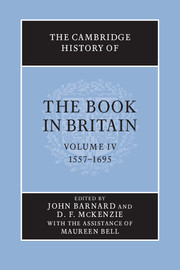Book contents
- Frontmatter
- Dedication
- Contents
- List of illustrations
- List of contributors
- Preface
- Acknowledgements
- Introduction
- RELIGION AND POLITICS
- ORAL TRADITIONS AND SCRIBAL CULTURE
- LITERATURE OF THE LEARNED
- LITERARY CANONS
- 16 Literature, the playhouse and the public
- 17 Milton
- 18 The Restoration poetic and dramatic canon
- 19 Non-conformist voices and books
- 20 Women writing and women written
- VERNACULAR TRADITIONS
- THE BUSINESS OF PRINT AND THE SPACE OF READING
- BEYOND LONDON: PRODUCTION, DISTRIBUTION, RECEPTION
- DISRUPTION AND RESTRUCTURING: THE LATE SEVENTEENTH-CENTURY BOOK TRADE
- STATISTICAL APPENDICES
- Abbreviations
- Bibliography
- Index
- Plate Section
- References
19 - Non-conformist voices and books
from LITERARY CANONS
- Frontmatter
- Dedication
- Contents
- List of illustrations
- List of contributors
- Preface
- Acknowledgements
- Introduction
- RELIGION AND POLITICS
- ORAL TRADITIONS AND SCRIBAL CULTURE
- LITERATURE OF THE LEARNED
- LITERARY CANONS
- 16 Literature, the playhouse and the public
- 17 Milton
- 18 The Restoration poetic and dramatic canon
- 19 Non-conformist voices and books
- 20 Women writing and women written
- VERNACULAR TRADITIONS
- THE BUSINESS OF PRINT AND THE SPACE OF READING
- BEYOND LONDON: PRODUCTION, DISTRIBUTION, RECEPTION
- DISRUPTION AND RESTRUCTURING: THE LATE SEVENTEENTH-CENTURY BOOK TRADE
- STATISTICAL APPENDICES
- Abbreviations
- Bibliography
- Index
- Plate Section
- References
Summary
this persecuted means of unlicenced Printing hath done more good to the people, then all the bloodie wars; the one tending to rid us quite of all slavery; but the other onely to rid us of one, and involve us into another. Richard Overton, A Defiance against all Arbitrary Usurpations (1646).
Captain Lieutenant William Bray (fl. 1647–59) is in many ways typical of the people who wrote the books that are the concern of this chapter. He is obscure: there is little we know in any detail about his life, and he only comes to our attention because he was visible in a volatile public context for a brief period of time. We have to work by inference from his writings to glean anything of substance concerning his background and the general conditions under which he lived. He served as a junior officer in the New Model Army and it would seem from his first published writings that he was immersed in the culture of godliness that so many who fought for the Parliament knew: intense Bible reading within unofficially sanctioned (and hence, before 1640 and after 1660, illegal) communities of believers. He would have known about hours and hours of prayer meetings and meetings of lay people during which the interpretation of scripture was disputed. He had a historical understanding of these godly practices that extended back into the sixteenth century, and his words are suffused with dense, seemingly spontaneously delivered millenarian terms. He wrote because he had been imprisoned on account of his sympathy with the Levellers–the popular, near-democratic movement that resisted the power of the New Model Army commanders (and their associates in Parliament) in the late 1640s.
- Type
- Chapter
- Information
- The Cambridge History of the Book in Britain , pp. 410 - 430Publisher: Cambridge University PressPrint publication year: 2002
References
- 2
- Cited by

